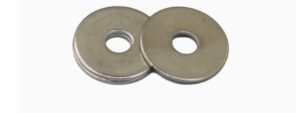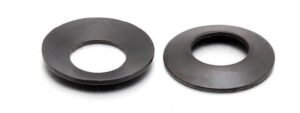12-point bolts, also known as 12-point flange bolts, have a unique head design with twelve contact points, making them ideal for applications requiring high torque, precision, and secure fastening in tight spaces. This distinctive design allows them to be tightened or loosened using a 12-point socket wrench, providing advantages over standard hex bolts in various industrial applications. Top 10 12-Point Bolt Manufacturers and Suppliers in China

Key Advantages of 12-Point Bolts
Higher Torque Capacity
The 12-point design allows for more torque to be applied compared to traditional 6-point bolts. This is because the increased number of contact points distributes force more evenly, reducing the risk of rounding off the bolt head, which can occur with hex head bolts. The ability to apply higher torque makes 12-point bolts essential for heavy-duty applications such as automotive engines, machinery, and critical infrastructure components.
Compact and Space-Saving
12-point bolts have a more compact head design than traditional hex head bolts, which makes them ideal for applications with limited space, such as automotive engines or heavy machinery. Their smaller footprint allows them to be used in areas where a standard hex bolt may not fit. In tight spaces where there’s limited clearance, the ability to work with a smaller tool and head is a huge advantage.

Reduced Slippage and Tool Damage
With twelve engagement points, a 12-point bolt provides a more secure grip for the wrench, minimizing the risk of slippage. This makes 12-point bolts more reliable in high-stress applications, reducing the likelihood of damaging both the tool and the bolt itself. The more contact points provide greater precision and ensure that the tool won’t slip, which can cause damage to the fastener or the surrounding components.
Versatility Across Industries
In many applications, 12-point bolts can replace hex socket cap screws, particularly where a flush or recessed fit is required. Their flange design also helps distribute clamping forces evenly, reducing the risk of material damage during fastening. This versatility is a key reason why they are favored in applications that require both aesthetics and functionality, like the automotive and aerospace industries.

Common Applications of 12-Point Bolts
Automotive and Racing Engines
12-point bolts are frequently used in high-performance automotive and racing engines. They are ideal for components like connecting rod bolts, cylinder heads, and exhaust headers where high strength and compact size are crucial. Their ability to handle high torque while maintaining a compact size makes them essential for tight engine spaces where every component must be securely fastened under high-stress conditions.
Heavy Machinery and Construction Equipment
In heavy-duty machinery, such as construction equipment and industrial machinery, 12-point bolts are chosen for their ability to withstand high loads, impacts, and harsh operating environments. Their increased torque capacity ensures secure and durable connections, even in the most demanding situations. Applications in construction and mining equipment rely on 12-point bolts for long-term performance under extreme conditions.
Oil and Gas Industry
The oil and gas sector frequently uses 12-point bolts, particularly in environments requiring high clamp loads and recessed bolt heads, such as in deep-water drilling rigs and offshore platforms. These bolts can resist the forces and vibrations associated with high-pressure and high-temperature conditions, ensuring that components remain securely fastened in challenging environments.
Mechanical Assembly
12-point bolts are commonly used in mechanical assemblies where components must remain securely fastened under vibration, stress, or frequent thermal cycles. Their design allows them to withstand these forces and ensure reliability in various mechanical systems, from manufacturing machines to power plants.
When Should You Choose 12-Point Bolts?
You should consider using 12-point bolts in the following scenarios:
- When high torque needs to be applied without damaging the bolt head. The additional points of engagement ensure that the torque is applied evenly, reducing the risk of head damage.
- In tight or limited access areas, such as automotive engines, heavy machinery, or construction equipment.
- Where a flush or recessed fit is needed for either safety or aesthetic reasons, such as in visible parts of machinery or automotive components.
- In applications that require reliability under high stress and vibration, like those found in aerospace, automotive, and energy industries.
- To reduce the risk of tool or fastener damage caused by slippage during installation.

Technical Specifications and Industry Standards for 12-Point Bolts
Material Strength and Durability
12-point bolts are often made from high-strength alloys such as stainless steel, alloy steel, or titanium, depending on the application requirements. These materials ensure that the bolts can withstand extreme pressures, temperatures, and corrosive environments. For example, Grade 8 12-point bolts are commonly used in heavy machinery and automotive applications due to their superior tensile strength, which makes them ideal for high-stress and high-torque environments.
Industry Standards
- ASME B18.2.1: This standard defines the dimensions for bolts, including 12-point flange bolts. It ensures that these fasteners meet specific requirements for size, strength, and application, ensuring consistency and reliability across industries.
- ASTM A325 and A490: These standards govern the strength and quality of bolts used in structural steel applications. Many 12-point bolts used in construction and machinery are manufactured to meet these rigorous standards, ensuring durability and safety.
- ISO 4017: This international standard specifies the characteristics of threaded fasteners, including bolts and screws, ensuring that 12-point bolts manufactured internationally adhere to the same quality and strength requirements.

12-Point vs. Hex Head Bolts: A Detailed Comparison
| Feature | 12-Point Bolt | Hex Head Bolt |
|---|---|---|
| Torque Capacity | Higher, more even distribution | High, but less than 12-point |
| Fit in Tight Spaces | Better, more compact head | Larger head, less compact |
| Tool Engagement | More points, less slippage | Fewer points, more slippage |
| Common Applications | Engines, machinery, critical joints | General construction, framing |
| Socket Required | 12-point socket | 6-point socket |
Conclusion
When precision, high torque, and reliability are paramount, 12-point bolts stand out as the ideal choice for many industrial and mechanical applications. Whether you’re working in automotive, construction, or oil and gas industries, their ability to handle higher loads and work in tight spaces gives them a significant advantage over traditional hex bolts.
Contact Hengrui Fastener for Custom 12-Point Bolts
For specialized applications that require custom solutions, Hengrui Fastener offers high-quality, customizable 12-point bolts and fasteners. Whether you need a specific size, material, or finish, Hengrui can provide tailored fasteners to meet your exact requirements. Visit Hengrui Fastener to learn more about our products and services.






